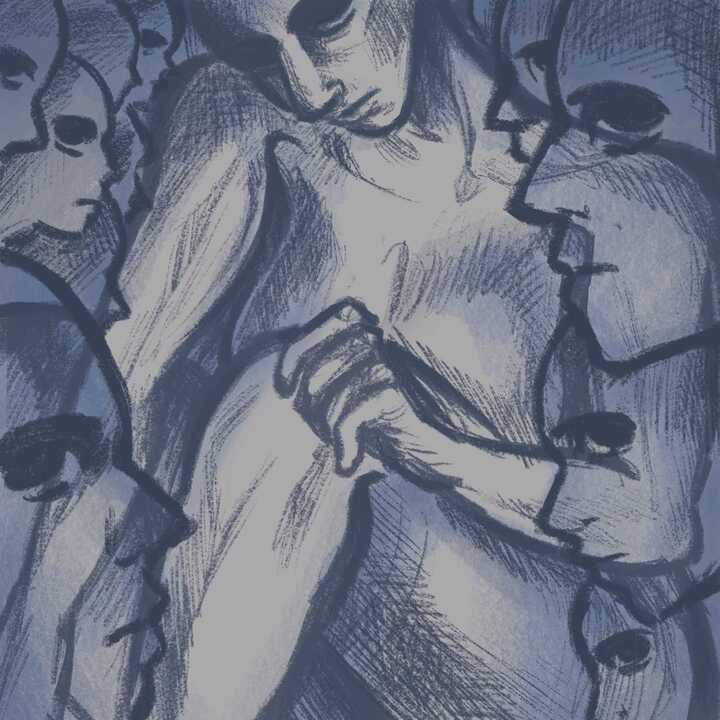Forum | Staff Columnists
“Pick me. Choose me. Love me.”: The evolution of the “pick-me girl”
“Pick-me” has grown meaningless. What does that say about our culture?
 Illustration by Anaelda Ramos
Illustration by Anaelda Ramos In my three semesters at WashU, I’ve sat in many discussion-based classes. In these seminars, we’ve read a diverse set of writers and theorists. Yet, one term has been attributed to at least one female thinker each semester. The term isn’t liberal or conservative, interesting or mundane, but “pick-me.”
Last semester, in two separate classes, students said this of Mary Wollstonecraft, an early writer and advocate for white women’s rights. I found this label to be accurate. Throughout “A Vindication of the Rights of Woman,” Wollstonecraft puts down other women, considering them unintelligent, overly emotional, and only concerned with pleasing men. Ironically, many have suspected she utilized these arguments to cater to a male audience.
The term “pick-me girl” originated on Twitter in 2016 but has since grown in popularity and given birth to trending hashtags and TikTok trends. It’s also grown common in everyday conversation (among people of all genders) and, as I’ve recently caught on to, even in the classroom. Dictionary.com defines a “pick-me girl” as “a woman who obsessively desires male approval and validation, often at the expense of other women.” Urban Dictionary explains that these girls and women seek “male validation by indirectly or directly insinuating that she is ‘not like the other girls.’” A classic example is a girl who claims she has more guy than girl friends because they are more “chill” or “down-to-earth.”
It was when people were wielding “pick-me” against many of the female authors we read in my classes, with an ambiguous explanation or lack thereof, that I grew suspicious of the word. I also saw this shift on social media; the quick search of “pick-me girl” on TikTok results in thousands of videos labeling essentially anything a girl could do as “pick-me.”
In this search, I came upon the concept of an “unrealized pick-me girl,” a girl who doesn’t even have to try and “is just cool.” In the video, a girl described her best friend as an “unrealized ‘pick-me’” because she always looks beautiful and socializes well without even trying. There’s also the “anti ‘pick-me’ girl who’s actually a ‘pick-me.’”
Now, girls could do almost anything and be a “pick-me.” And what is a “pick-me boy”? There isn’t really one.
The original definition of “pick-me girl” points to a real frustration among girls and women, where our female counterparts sacrifice us for the attention of men. It’s an experience most of us have had at least once. Yet in utilizing the label, we are putting girls and women down too. Is the answer to these frustrations continuing the cycle?
“Pick-me” also points to another issue among girls: the need to seek male validation. Girls (of all sexualities) are taught from a young age that they should want to seek this validation. Yet in using the term, we are pointing our finger at the girls, rather than asking what makes us seek this validation in the first place.
The “pick-me” phenomenon is spreading as the definition grows more and more ambiguous. In turn, we are all becoming implicated in a greater misogynistic culture.
Suddenly, “pick-me” can mean almost anything. “Pick-me girls” aren’t “like other girls” because they take on “masculine” traits, like playing video games, to attract men. But they are also girls who take on “feminine” traits, like wearing makeup, to attract men. These definitions reinforce stereotypical ideas of “masculine” and “feminine” where women can never win. If you don’t want to be a “pick-me,” you must reach the perfect mix between subjective “masculine” and “feminine” traits. Except in doing so, people will say you’re a “pick-me” anyway, trying too hard to reach this balance.
Surpassing this paradox, many “pick-me girl” labels disregard male validation altogether. Now, “pick-me” girls can be girls who do anything for attention, period. Of course, we often don’t know if someone is doing something for attention. And of course, we all (regardless of our gender) do things for attention sometimes.
“It’s the patriarchy!” is an unsatisfying, potentially unhelpful, or even obvious analysis of the “pick-me girl” phenomenon. Many people would consider this as taking a joke too seriously, and I get it. But like any other “unserious” label, the term points to a real social irritation.
The “pick-me girl” in its original form points to a feeling of disunity and disrespect between girls and women. The term criticizes women for their criticizing women, essentially fighting fire with fire, and signifying our current inability to break a misogynistic cycle.
The “pick-me girl” signifies a need to talk about frustrations among girls, but an inability to do it constructively or respectively — this isn’t our fault. Girls aren’t taught how to talk about these things without pitting ourselves against one another. It indicates the need for a collective effort among women and girls to fight this disunity by trying to reform our bonds rather than further strain them. It also points to a frustration with the pressure for male validation, but a need to share our own experience with this pressure, rather than just pointing fingers at others.
In writing this article, I too am meeting some definition of the “pick-me girl.” And in calling me one, you would be a “pick-me” too. So now that we’ve all identified ourselves as occasionally or always “pick-me,” let’s start questioning what it is we are using the term to criticize and if calling someone “pick-me” is the most productive way to do so.
